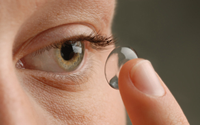- +91 80 41509150
- info@pearloptics.in

FREEDOM WITH CONTACT LENSES
Many of our customers are enjoying the freedom that wearing contact lenses for vision correction brings. In our Complete Eye Clinic, we’ll teach you how to wear contacts, and help you choose a modality, like disposable daily, fortnightly, monthly, or even long lasting conventional lenses.
For active and busy lifestyles, ask us about your suitability to become one of many who enjoy comfort and freedom in today’s newest materials.
To enhance your appearance, and compliment your attire, we carry a full range of exciting cosmetic color lenses, with or without power correction. These allow you to choose a subtle change or a bold new look and present a new “you” anytime, anyplace.
So go ahead and change the way you look at the world and the way the world looks at you !
RGP
Soft contact lenses are most common, but there is another lesser-known category of contact lens materials: gas permeable (GP) contact lenses, also known as RGPs, rigid gas permeable, or oxygen permeable lenses.
GP contact lenses are rigid, but they shouldn't be confused with old-style "hard" contact lenses, which are now obsolete. Hard contact lenses were made of a material known as PMMA. Before 1971, when soft contact lenses were introduced, just about all contact lenses were made from PMMA.
The problem with PMMA lenses is that they are difficult to get used to and somewhat uncomfortable to wear. Also, PMMA does not allow oxygen to pass through it, and healthy eyes need plenty of oxygen.
GP lenses were first introduced in the late 1970s; they are actually a newer technology than soft lenses. Most GPs incorporate silicone, which makes them more flexible than PMMA. And silicone is oxygen permeable, so oxygen can pass through GP lenses, resulting in greater comfort and better eye health.
In fact, GPs transmit more oxygen to the eye than do traditional soft contact lenses (although some silicone hydrogel soft lenses are comparable to GPs in oxygen transmission).
GPs can also provide better vision, durability, and deposit resistance than soft contact lenses. They can be easier to clean, and since they're long-lasting, they can be less expensive in the long term than soft lenses.
The Benefits of GPs
GPs offer some outstanding benefits over soft lenses. For one, because an RGP is made of a stiff material, it retains its shape well when you blink, which tends to provide crisper vision than would a soft lens.
GPs are extremely durable. Although you can break them (for instance, if you step on them), you can't tear them easily, like soft lenses.
And they're made of materials that don't contain water (as soft contact lenses do), so protein and lipids from your tears do not adhere to GPs as readily as they do to soft lenses.
With a little care, they may last for years, as long as you don't require a prescription change.